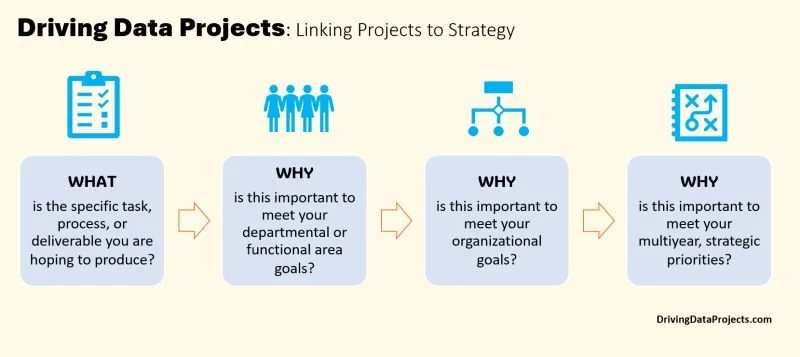Taxonomy v Folksonomy
The concepts of taxonomy and folksonomy hold significant implications, especially in the context of emerging technologies like OpenAI. While traditional taxonomies offer structured hierarchies of knowledge, allowing for a systematic approach to information organization, folksonomies represent a more fluid and emergent way of categorizing information based on user-generated tags and metadata.
However, the challenge arises when technological advancements fail to incorporate divergent thinking and promote groupthink through convergent taxonomies. This phenomenon is particularly evident in language models, where developers' linguistic and cultural biases can influence the interpretation and representation of (the dominant) language.
4 Perspectives to drive effective data translation
When driving data projects, you will encounter business stakeholder challenges that often go unspoken. This is not always because people hold back but because they don't fully know how to vocalize their constraints.
If they can't directly address their requirement, chances are we can't either. To hear others' speech, we start by asking questions from different perspectives.
Resistance mitigation strategies
Change management wouldn’t be so hard if it weren’t for…the people. Open issues or objections left unresolved today cost time down the road. Suppose work starts before these concerns are mitigated. Stakeholders might get frustrated or begin to hold back their participation. Work produced might have difficulty getting implemented. Buy-in realizes impact.
Linking projects to strategy
It can be challenging when stakeholders cannot translate business questions into technical requirements or do not provide enough context for data teams to do so. From there, the data team is often left to maintain the status of a series of ad hoc projects rather than connect these business questions to a larger more defined data strategy.
Finding Meaning in Data Projects by Asking: Why
Most data teams cover WHAT and HOW with standard reports and KPIs. They will optimize processes and analyze business domains impacting the company's bottom line from a data perspective.
But how many data teams truly understand the WHY behind the reports they generate? How many actively consult with the business as a true partner to understand the underlying business concerns behind the numbers? Without the WHY, delivering true value in the WHAT and HOW is ten times harder.
Going Deeper: Making Projects Work
When defining needs is ignored, it can stifle progress faster than the stickiest government red tape. For example, when we cannot translate our business requirements into data or more technical requirements, we lose the ability to make informed decisions. Or, when we lack the courage to confront the poor content of a colleague, we lose the collective ability to influence as a team and move the group, initiative, or business forward. Guess what? That was in our control, too.
Driving Results With Others: Emotions Are Contagious
Emotions are contagious. When we’re in the presence of challenging people, we are more likely to take on some aspect of their emotional state. However, if you are mentally prepared, you can create enough psychological distance to remain calm and neutral in the presence of volatility.
Driving Results With Others: Don't Compromise...Yourself
It is not easy to take a stand, especially when the stakes are high. Knowing ourselves enough to know what works for us and what doesn’t, and integrating those things into our daily practices is what helps us recognize unhealthy compromise when it comes knocking.
Driving Results With Others: You Are In Control
You have more in control over yourself and your circumstances than you think. If you're dealing with the difficulties of challenge and change, remember that you have tools and strategies of your practice (faith, reflection, meditation, simple breathing, naming your feeling, choosing alternative responses) you can rely upon.
Driving Results With Others: Be Your Own Guide
To cope with momentary stress or that of larger goals, commit to a practice. Investing in developing muscle memory pays off in better performance and smarter choices under pressure. Practice helps you process much of the "static of life” with greater skill.










